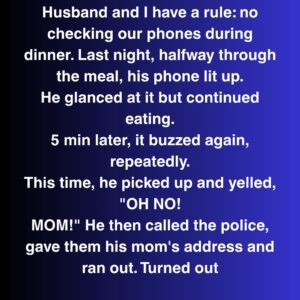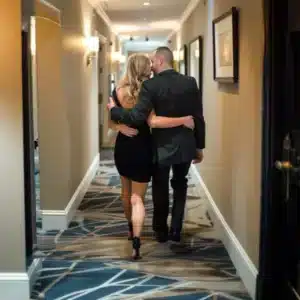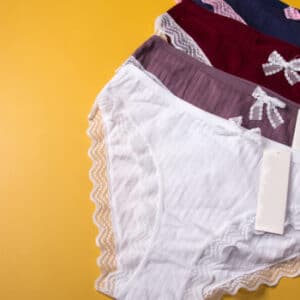At first, it was little things.
A surprise cold. A weird plumbing issue. One time, my mother-in-law even said her back locked up while making toast. Every weekend, it was something new. Always just enough of an excuse to cancel.
My daughter Pia is seven, all sparkles and giggles and glitter trails. My son Kellan just turned four—he’s the kind of kid who could charm a statue into smiling. They used to spend weekends at Nora’s—my mother-in-law’s house—a place filled with pancake mornings and bedtime stories. They loved it.
And then, suddenly, they weren’t welcome anymore.
I didn’t panic right away. Life happens, right? But “next weekend” kept getting pushed. And eventually, I couldn’t ignore the pattern: she was dodging us. No explanation. Just increasingly vague excuses.
When I brought it up to my husband, he shrugged. “She’s probably tired,” he said. “Maybe she just needs space.”
But Nora is the kind of woman who handwrites thank-you notes and power-walks with her neighbor’s dog every morning. “Tired” wasn’t her.
And yet… she still dropped off random gifts. Glitter pens for Pia. Dinosaur gummies for Kellan. Always with a sticky note: “Miss you! Soon!”
But soon never came.
Then came the moment that changed everything.
Last Friday, I called Nora again. I asked, gently but firmly, if the kids could come by. Just for the afternoon. Her voice was sweet, but hesitant.
“Not a good time, honey. Maybe next—”
And then I heard it.
A child’s giggle.
Not Pia. Not Kellan. Definitely not a TV.
Real. Alive. Nearby.
She went silent.
I asked, “Was that a kid?”
There was a pause—too long. Then she laughed awkwardly. “Oh, probably something outside. I’ve got to run. Love you!”
Click.
I stared at the phone. My gut twisted.
That night, I told my husband. He didn’t think much of it. “Maybe her friend’s kid came over. You’re overthinking this.”
But I wasn’t. I knew what I heard.
And I needed the truth.
The next afternoon, while Kellan napped and Pia colored, I drove to Nora’s house alone. She answered the door in an apron, flour on her cheek, smelling of cinnamon and nerves.
“Oh! I didn’t know you were coming.”
“I figured we could talk,” I said, stepping in before she could hesitate.
She led me to the living room. There was a mixing bowl on the table and… something else. A tiny pink sneaker, half-hidden under a side table.
She noticed me looking and quickly shifted it with her foot.
That was all the confirmation I needed.
I sat down slowly. “Who’s the child, Nora?”
Her whole face crumpled.
“My friend Rosetta’s granddaughter,” she whispered. “Her name is Jori. She’s five. Her mom—Candace—had a health crisis. Serious. Rosetta begged for help. She can’t care for Jori on her own anymore.”
I blinked. “So you’re… caring for her?”
Nora nodded, tears in her eyes. “She’s been through so much. Panic attacks. Night terrors. She barely talks. I didn’t want Pia and Kellan to see her like that. I didn’t want to scare Jori either. She’s so fragile.”
“Why didn’t you just tell us?”
“I was ashamed,” she admitted. “I thought you’d think I was replacing your kids. But I’m not. I miss them every single day.”
I exhaled, everything softening. “You weren’t trying to shut us out. You were trying to protect everyone.”
Nora wiped her eyes. “I didn’t want drama. But I see now… keeping secrets created it.”
We talked for over an hour. About Jori. About Rosetta. About how sometimes, trying to do everything quietly just ends up making everything harder.
By the end of it, we had a plan: a short visit on Sunday. Nothing overwhelming. Just a test. A gentle step toward something better.
That Sunday, Pia practically flew out of the car, coloring kit in hand. Kellan held his favorite dinosaur plushie and asked, “Will Grandma make pancakes?”
Nora opened the door. She looked nervous. But behind her, clinging to a unicorn and peeking from the hallway, was a little girl with wide eyes and curls.
Jori.
Pia knelt down immediately and offered her sparkliest crayon. Kellan handed her his dinosaur. She smiled—a real, hesitant, sweet smile.
And the giggle I heard days ago returned. This time, I saw the face behind it.
By the time we left, the living room looked like a glitter bomb had gone off. The kids were happy. Nora was lighter. Jori had new friends.
And me?
I realized something simple but profound:
Sometimes when people shut you out, it’s not rejection—it’s protection.
And all it takes to come back together…
Is asking to step inside.





